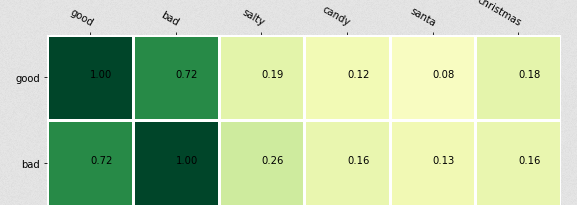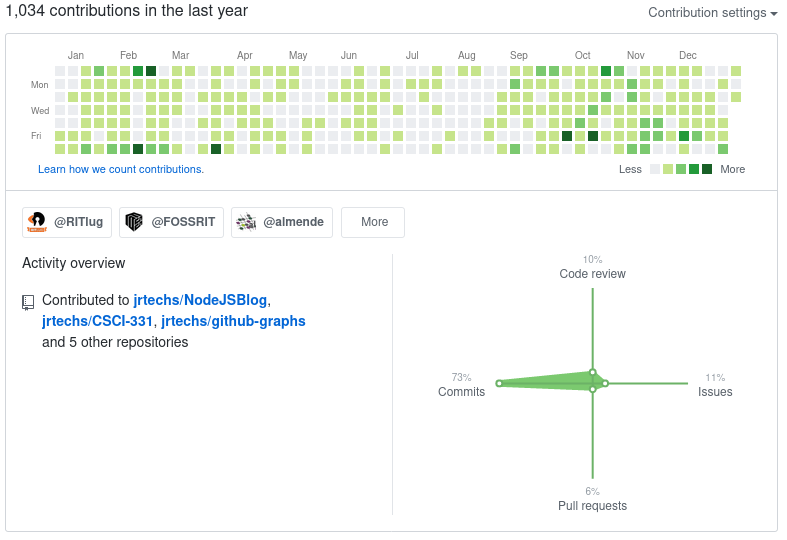
Word Embeddings
Sat May 16 2020
Word embeddings have stolen all my attention the last week. At a very high level, embeddings allow you to reduce the dimensionality something into a smaller vector that conveys positional meaning in that latent space. When considering something like a word, this is very useful because it enables you to use the vectorized version of the word in a secondary model. Since words that have similar meanings group together, it makes training faster. Computerphile has a fantastic video of this on Youtube.

Image Clustering with K-means
Tue May 12 2020
1 K-Means Algorithm
The general idea of clustering is to group data with similar traits. The main benefit of this is the ability to extract information from new data because you know what it is most similar to, thus giving you valuable insight. In the field of machine learning, clustering is considered unsupervised learning because it requires no labels on the data – the algorithm auto assigns clusters, and you infer behavior off of those clusters.
Clustering has many applications such as image segmentation, preference predictions, compression, model fitting.

How Films Portray Control
Sun May 10 2020
Sit down and grab a drink because it is time that we talk about the LSD trip that is the 1981 movie Shock Treatment. Shock treatment can be called a sequel to Rocky Horror; however, the storylines are very different, and the only common thread is our main actors Brad and Janet. Where Rocky Horror was a play about lust and sexuality, shock treatment was a musical about questioning your sanity… or something along those lines.
The problem with Shock Treatment -and part of why I loved it so much -was that it was a satire on absolutely anything and everything. The message of the show was unfocused; it shot a ton of stuff at the wall and let the viewer fill in meaning. Many themes could be elaborated on within this show, including mental health, control, gender norms, consumerism, censorship, human nature, and manipulation. Most subjects were one-off and did not serve further the plot that much, but other topics struck home. The show is still well worth the watch because it’s entertaining, and it’s eerie to see how well a movie from the early ’80s reflects society today. Moreover, newer shows like Westworld and Black Mirror are still portraying the same messages about control and consumerism but, using different narrative structures than the ones used in Shock Treatment.
1 Plot

Hosting Your Own Gitea Server
Sat May 02 2020
1 The Premis
Last week I started hosting my own git-forge to track sync all of my git projects. Between school, open-source communities, and personal projects, I have accumulated a dubious amount of git projects. Although most of my content gets hosted on Github, I also had a fair quantity of local projects, stuff on scattered GitLab instances, and other places. I decided to use Gitea to mirror all of my repositories and keep them in a central location that I can quickly search for them.

For simplicity, I decided to host my Gitea instance on a DigitalOcean droplet using docker and add SSL encryption using a reverse Nginx proxy using a let’s encrypt.
2 Installation

Working Remote
Thu Apr 09 2020
Last week I watched my professor drone on for seven hours about computer circuitry. As my eyes struggled to stay open as he babbled about SR-latches, I wondered: what sequence of dreadful mistakes did I make to land myself in this situation. I got through my entire college career without pulling a single all-nighter, yet that night changed it all.
Although I could have followed along with the lecture material during the regular class time, remote learning made a tantalizing temptation to procrastinate and binge two and a half weeks of lecture material in one night –two nights before the exam. Ironically, I ended up doing remarkably well on that exam and felt prepared for every question; nerveless, it still begs the question… Why? After asking around, I found that all eight of my friends taking the class also binged the lecture videos before the exam.

Recent Posts
My Wall Mounted Raspberry Pi HomelabThe Data Spotify Collected On Me Over Ten Years
Visualizing Fitbit GPS Data
Running a Minecraft Server With Docker
DIY Video Hosting Server
Running Scala Code in Docker
Quadtree Animations with Matplotlib
2020 in Review
Segmenting Images With Quadtrees
Implementing a Quadtree in Python